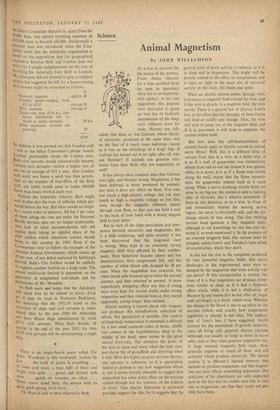Science
Animal Magnetism
By JOHN WILLIAMSON
It has always been assumed since that Galvani was right, and Mesmer wrong. Magnetism, it has been believed, is never produced by animals, nor does it have any effect on them. You may not touch a high electric voltage, but you may touch as high a magnetic voltage as you like, even though the magnetic influence passes through your flesh, so that you can hold a nail to the back of your hand with a strong magnet held to your palm.
But in view of the close association and inter- action between electricity and magnetism, this is a little surprising; and quite recently it has been discovered that the long-held view is wrong. Mice kept in an extremely strong magnetic field were affected by their confine- ment. Their behaviour became calmer and less demonstrative, their temperature fell, and the number of white blood cells dropped by 40 per cent. When the magnetism was removed, the white blood cells bounced up to twice the normal number, and then returned to normal. A more superficially intriguing effect was that if young mice were kept for several weeks under strong magnetism and then released from it, they stayed apparently young longer than normal.
Almost nothing is known about why magnet- ism produces this miscellaneous collection of effects. But speculation is possible. The control of fixed body temperature in mammals is effected by a few small scattered cubes of brain, chiefly two centres in the hypothalamus, deep in the middle of the head, mere raisins in the great mental fruit-cake, that stimulate the pores of the skin to open and sweat when the heat rises, and throw fits of gooseflesh and shivering when it falls. How this highly accurate nervous thermo- stat operates is unknown, so it is speculation indeed to pretend to say how magnetism affects it; but it seems initially plausible to suggest that magnetism has some direct effect on the nervous system (though not, for instance, on the kidneys or liver). That murine behaviour is quietened provides support for this, for it suggests that the general level of brain activity is reduced, as it is in sleep and in hypnotism. This might well be directly related to the effect on temperature, and it takes us right to the main site of electrical activity in the body, the brain and spine.
When an electric current passes through wire, it produces a magnetic field around the wire, and if the wire is already in a magnetic field, the wire moves. There is a general law of physics, Lenz's law, to the effect that the interplay of these forces will tend to nullify any change. Thus, the wire will tend to jump out of the magnetic field, and if it is prevented it will tend to suppress the current within itself.
But how does this self-destructiveness of natural forces apply to electric current in animal nerve fibres? Well, this is a different kind of current from that in a wire. In a metal wire, it is as if a trail of gunpowder was immediately ablaze from end to end the instant it was ignited, while, in a nerve, it is as if a flame runs evenly along the trail, except that the flame reconsti- tutes the gunpowder behind itself as it races along. When a nerve discharge travels from my spine to my big toe, the current is only a running eddy of electrons, not a massive movement of them in one direction, as in a wire. In front of and immediately behind the moving active region, the nerve is electrically still, and the dis- charge spirals its way along. This tiny twirling current must generate a tiny magnetic eddy, although to my knowledge no one has ever de- tected it, or even mentioned it. In the presence of an external magnetic field, this current must be damped, unless Lenz's and Faraday's laws admit of eccentricities, which they don't.
Is this not the clue to the symptoms produced by very powerful magnetic fields; that nerve discharges in the experimental mice were so damped by the magnetism that brain activity was cut down? If this interpretation is correct, the irony of it is that magnetism can produce symp- toms similar to sleep, as if it had a hypnotic effect which, while it is not a vindication of Mesmer by any means (for he did, after all, begin with astrology), is a nicely rueful twist. Whether the change in the blood is due to an effect on the nervous system,- and exactly how temperature regulation is altered, is not clear. The applica- tion of Lenz's law, I have suggested, would account for the retardation of growth, however, since all living cells generate electric currents (although not usually so large as those in nerve cells), and so they must generate magnetism too. A large external magnetic field must, then, generally suppress or retard all those vital cell activities which produce electricity. We should confess it to Mesmer's injured memory that animals do produce magnetism, and that magnet- ism can have effects resembling hypnotism. Our criticisms of his charlatanry are only supported now by the fact that his results were not, in fact, due to magnetism, not that they could not pos- sibly have been.


































 Previous page
Previous page